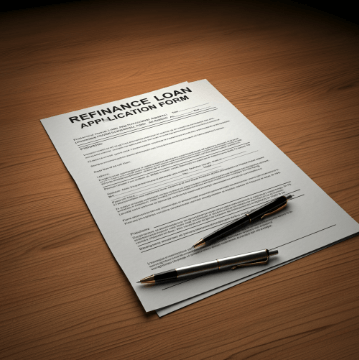Deciding whether to refinance or sell your house in Florida is a significant financial choice, especially with the real estate market seeing constant shifts. Recent reports reveal that the average 30-year fixed mortgage rate currently stands at around 7%, significantly influencing refinancing expenses and housing affordability. If you’re struggling with this decision, you’re not alone. Many homeowners weigh the pros and cons, asking, “Should I refinance or sell my house in Florida?” Steve Daria and Joleigh, renowned real estate investors and cash house buyers, are here to help with a tailored solution. Their expertise ensures you’ll make the best decision for your financial future. Whether you’re aiming to free up equity, reduce your mortgage payments, or move on to a fresh start, they can provide you with clear guidance. Contact Steve and Joleigh today to book a free discussion and explore your options. If you’re still asking yourself, “Should I refinance or sell my house in Florida?” now is the perfect time to find the answers you need.
Key Points
- Understand the Current Market Conditions: Market trends greatly influence your decision. If property values in your area are high, selling could help you maximize your profits. On the other hand, refinancing might make more sense if market rates have dropped and you want to lower monthly payments.
- Evaluate Your Financial Goals: Think about what you want to achieve financially. If you want to free up equity for other investments or pay off debts, selling your home could be the right step. Refinancing, however, might help you save money over time if lowering your interest rate is possible.
- Consider Interest Rates: Refinancing makes sense when mortgage rates are lower than you currently pay. However, refinancing could cost more in the long run if rates are rising or already high. Selling might be better, especially if your home has been appreciated.
- Assess Your Property Value: Knowing your home’s current market value is key. If your property has increased significantly, selling could yield a large return on your investment. However, refinancing might offer more immediate financial relief if the market is slow.
- Review Your Circumstances: Your lifestyle and plans should also guide your decision. Are you planning to move soon or do you need a bigger house? Selling might work best. Staying put but needing financial flexibility? Refinancing might offer a better solution.
What does it mean to refinance my house in Florida?
Refinancing your home in Florida means getting a new mortgage to replace your current one, usually to get better loan terms.
This process allows homeowners to lower their interest rates, reduce monthly payments, or switch from an adjustable-rate mortgage to a fixed rate.
Additionally, refinancing can help you pull out equity from your home as cash, which can be used to pay off debts, invest, or cover major expenses.

Keep in mind that refinancing isn’t free—it comes with closing costs and fees. You’ll also need to qualify based on your credit score, income, and home value.
Homeowners often ask, “Should I refinance or sell my house in Florida?” to determine which option best supports their financial goals.
Refinancing makes sense if you plan to stay in your home long-term without taking on more debt.
But if selling offers the chance to profit from rising property values, moving might be the better choice.
Always weigh the long-term benefits of refinancing against your current financial needs.
A trusted mortgage advisor or real estate expert can help you find the best option for your needs.
Get An Offer Today, Sell In A Matter Of Days…
How do I know if selling my house in Florida is the right option for me?
Whether selling your house in Florida is right depends on several important factors. Start by assessing the current state of the real estate market in your area.
If home prices are high and there’s strong demand, this could be an ideal time to sell and maximize your profit.
Next, consider your personal circumstances. Are you planning to relocate, downsize, or look for a bigger space? These life changes often make selling a practical choice.
Think about your financial goals as well; selling your home can offer a significant lump sum of money, allowing you to reinvest, settle debts, or pursue new opportunities with greater financial freedom.
Additionally, weigh the costs of maintaining your current home versus the potential benefits of selling it.
Ask yourself, “Should I refinance or sell my house in Florida?” to thoroughly explore your options.
If your house has appreciated significantly and your lifestyle supports a move, selling may be the best option.
Consulting with real estate professionals can help you make the most informed decision.
What factors should I consider when deciding to refinance or sell in Florida?
- Current Market Conditions: Take a close look at the real estate market in your area. If home prices are soaring, selling might help you get the highest return, while rising interest rates could make refinancing less appealing.
- Your Financial Goals: Think about what you need financially. Are you aiming to lower your mortgage payments or consolidate debt? Refinancing might help. If you need a big sum of money to fund plans like moving or investing, selling your house could make more sense.
- Personal Circumstances: Your life situation matters a lot in this decision. Are you staying put for years or planning to move soon? If it’s the latter, selling can set you free to relocate without the burden of a large loan.
- Interest Rates: Low interest rates make refinancing more attractive, as they could save you thousands in the long run. However, if rates are high, you may want to evaluate whether refinancing is still a good fit carefully.
- Property Value and Equity: Check how much equity you’ve built in your home. If your property value has increased significantly, selling could mean a larger profit. If you’re not ready to move, tapping into that equity through refinancing might be smart.

How do market conditions in Florida impact my decision?
Market conditions in Florida play a key role in deciding whether to refinance or sell your house.
If there’s high demand for homes and property values increase, selling might allow you to earn significant profits.
On the other hand, if values are stable or dropping, refinancing could be a better option to lower your mortgage rate or tap into your home’s equity without selling.
Interest rates are another important factor. When rates are low, refinancing can save you money by reducing your monthly payments, but higher rates might make it less appealing.
Florida’s economy also affects housing trends—if the job market is strong and more people are moving to the state, buyers may offer competitive prices for your home.
Ask yourself, “Should I refinance or sell my house in Florida?” to weigh both options against these external factors.
Understanding long-term trends, like whether the market favors buyers or sellers, can guide your decision.
Consulting with local real estate experts can also help you better assess your timing and maximize your financial benefits.
How do I calculate the potential savings from refinancing my home?
- Compare Current and New Interest Rates: Start by looking at your current mortgage interest rate and compare it to the rate offered for refinancing. Lower interest rates have the potential to significantly reduce the overall cost of a loan, saving you substantial amounts of money in the long run.
- Calculate Monthly Payments on the New Loan: Figure out your monthly mortgage payment with the refinanced loan. Include the new interest rate, loan amount, and loan term in your calculations to see if you would pay less each month.
- Include Closing Costs: Refinancing your mortgage can save you money, but it’s important to consider the costs involved. Common refinancing costs include appraisal fees, loan origination fees, and other charges. Make sure to calculate the total upfront expenses and determine how long it will take for your monthly savings to offset these costs.
- Evaluate the Loan Term Difference: Consider how the length of the new loan compares to your current one. Extending the loan term may lower your monthly payments but could also mean paying more interest over time.
- Use Online Refinancing Calculators: Use online mortgage calculators to estimate potential savings. These tools make it easy to input details like your current loan, refinancing rate, term, and costs to see if refinancing is worth it.
How do I prepare my house for sale in Florida to increase its market value?
Preparing your house for sale in Florida is essential to increase its market value and attract serious buyers.
Start by decluttering and removing personal items to create a clean, open space that potential buyers can envision as their own.
Fixing leaky faucets, patching wall cracks, and updating old fixtures can greatly improve your home’s appeal.
Don’t forget to enhance curb appeal by tidying up your landscaping, painting the front door, and keeping your lawn neat.
Staging your house with modern, neutral décor can also help it feel inviting and give buyers a great first impression.
If you’re still asking, “Should I refinance or sell my house in Florida?” selling your property in top condition can maximize your profit.
For more personalized advice, reach out to Steve Daria and Joleigh, expert real estate investors who also buy houses for cash.
They can guide you through the process or even make a fair cash offer if you want a quick and hassle-free sale.
Don’t wait—start preparing your home to make the most of the Florida market!
**NOTICE: Please note that the content presented in this post is intended solely for informational and educational purposes. It should not be construed as legal or financial advice or relied upon as a replacement for consultation with a qualified attorney or CPA. For specific guidance on legal or financial matters, readers are encouraged to seek professional assistance from an attorney, CPA, or other appropriate professional regarding the subject matter.

